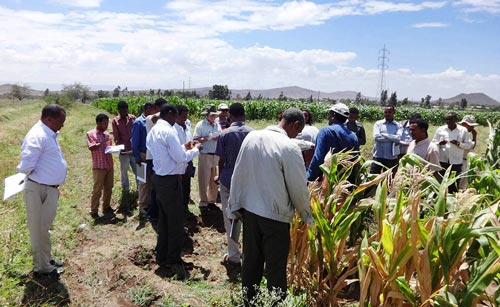By Seifu Mahifere/CIMMYT
The Nutritious Maize for Ethiopia project (NuME) is working to promote quality protein maize (QPM) by making sure new varieties fit farmers’ specifications. The project conducted a training event on farmers’ and consumer participatory evaluation (FCPE) methodologies to ensure that QPM varieties developed and disseminated by NuME reflect the tastes and preferences of targeted farmers.
About 25 staff from national and regional research centers, regional bureaus of agriculture, Ethiopian seed enterprises and Sasakawa Global 2000 participated in the event during 6-8 March at the Melkassa Agricultural Research Center, southeast of Addis Ababa. The event addressed the basic principles of FCPE, methods of organization of FCPEs, as well as data entry, analysis and reporting of results.
Participants made a field trip to a NuME seed multiplication site run by the Melkassa center and observed the agronomic features of QPM varieties being grown on 4 hectares. They also tasted, smelled and observed food products made from QPM and conventional variety maize and gave their preferences. The trainees will follow this procedure when they conduct FCPEs with farmers and consumers in their localities. They need to understand farming systems of their localities, identify the criteria farmers use to evaluate varieties and understand ways of conducting on-station evaluations and evaluation during surveys.

The training was facilitated in part by Hugo de Groote, a CIMMYT economist based in Kenya, while Nilupa Gunaratna of the Harvard University School of Public Health covered the FCPE data analysis and reporting methodologies. Sasakawa Global 2000 and NuME staff members also made presentations on sensory evaluation for QPM food preparations as well as gender considerations in undertaking FCPEs.
Formally opening the training, Getachew Ayana, director of the Melkassa Research Center, noted that the center is “very pleased to host this important training, which helps to upgrade the skills of the participants on farmers’ evaluation methodologies of QPM varieties.” He noted that farmers’ evaluation of QPM varieties is critical to the success of NuME, which is currently developing and disseminating new QPM varieties in the major maize areas of the country.
Experience gained both from the Quality Protein Maize Development (QPMD) project (the predecessor to NuME) and other social science research indicates that failure to ensure the incorporation of farmers’ tastes and preferences for the varieties beforehand leads to farmers not adopting varieties they do not like. “It is thus absolutely critical that farmers and consumers are aware of the products we promote and that they like them from many points of view – taste, productivity and even color,” de Groote said, adding, “It is not enough that farmers and consumers like a particular variety, but we also need to make sure that they are also willing to pay for it.”
Adefris Teklewold, NuME project leader, noted the training took place at a good time for the project when major seed breeders in the country are in favor of promoting QPM. He said the training helped “to convince ourselves and farmers that QPM really helps improve the nutritional status of children and farmers in general.” Teklewold also underscored the need for the participants to disseminate the knowledge gained from the training to others through the ‘train the trainers’ methodology.
 Capacity development
Capacity development 
